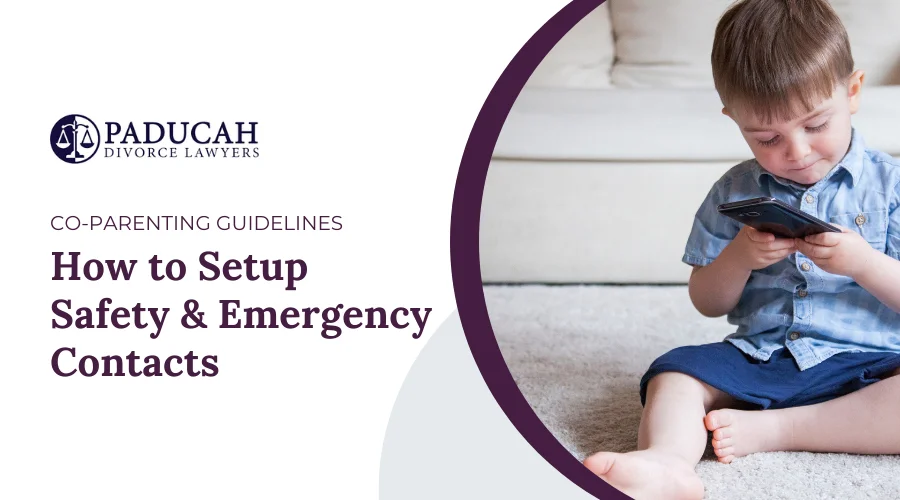Co-parenting is like a journey where moms and dads must talk and work together for their kids. One important thing many people forget is having emergency contact info for both parents. This blog discusses parents’ problems when talking to each other and why having a good emergency plan is important.
We want to help parents prepare for unexpected situations for their kids’ safety. Let’s learn about co-parenting and ensuring families are ready for anything together. Enhance your knowledge about our legal services by arranging a complimentary initial consultation with the Paducah Divorce Lawyer.
Communication Issues with Co-Parenting
Co-parenting gets more complicated during emergencies, which can be a big problem. If there’s a delay in parents responding, it might be dangerous for kids. This happens when parents don’t talk enough, and there are unresolved problems or differences in raising kids.
This confusion can worsen in emergencies, so parents must communicate well and understand each other. That’s why having a good plan for who to contact in emergencies is so important—it keeps kids safe. So, ensuring parents have a clear way to talk and a good emergency plan is crucial for caring for the kids.
Responding to an Emergency Contact Relationship
Establishing a clear and reliable emergency contact relationship is essential for effective co-parenting. Begin by openly discussing and documenting emergency contact information.
Ensure that both parents can access each other’s phone numbers, addresses, and other relevant details. Additionally, consider sharing this information with trusted family members or friends who can act as secondary contacts in case of unavailability.
Creating a Family Emergency Plan
Making a good family emergency plan is super important for co-parents. This plan helps everyone know what to do if something bad happens. It’s like a map that tells us how to work together during a crisis. We must prepare in both homes by having important things like first aid kits and emergency supplies.
Also, parents must share contact info to quickly talk during emergencies. The plan should include other people, like family or friends, who can help if needed. Deciding on a special meeting spot makes the plan even better, ensuring everyone stays safe and cared for.
Be Prepared in Both Homes
Getting ready in both co-parenting homes is more than just talking—it means being prepared with actual things. Ensure each home has a complete first aid kit with all the important stuff for small injuries or health problems.
Create a list with everyone’s contact information, not just the parents but others who can help if needed. Also, keep any medicines needed for the kids in both homes. This way, no matter where the kids are, they have what they need in case something unexpected happens.
It’s a team effort to be ready, showing that both homes are committed to keeping the kids safe and well.
Make Sure the Right People Can Contact Both of You
It’s not just about having the phone numbers of co-parents; it’s also important to say clearly who else should be called in an emergency. This includes the main parents and trusted friends, family, or caregivers who can help immediately.
Use technology like apps or messaging to make talking fast and easy during emergencies. This way, everyone stays connected, and information flows smoothly. By planning and deciding who to contact, co-parents ensure their emergency plan works well, making it more reliable and effective in keeping everyone safe.
Have a Planned Reunification Point
During an emergency, co-parents must have a specific meeting spot. This spot should be familiar and easy to get to, reducing problems during stressful times. It’s like a central meeting place where parents quickly come together to ensure the kids are safe.
Having a planned spot adds certainty and organization to the plan, making it work better overall. This way, co-parents can work together smoothly, figure out the situation, and ensure the children feel secure. Choosing a clear meeting point is a key part of a good emergency plan for co-parents.
Pros
- Improved communication during emergencies.
- Enhanced safety and well-being of the children.
- Strengthened trust between co-parents.
Cons
- Initial discomfort in discussing emergency plans.
- Potential disagreements on the choice of emergency contacts.
In the realm of co-parenting, ensuring the safety of your children should be a top priority. Establishing a solid emergency contact plan addresses communication challenges and contributes to a more secure and harmonious co-parenting relationship.
By being prepared in both homes, making sure the right people can contact both parents and having a planned reunification point, co-parents can confidently navigate emergencies. Remember, effective co-parenting is a continuous journey of collaboration, and prioritizing emergency preparedness is a crucial step in safeguarding the well-being of your children.
Also Read This Article Parental Relocation: Laws, Requirements, and Considerations






